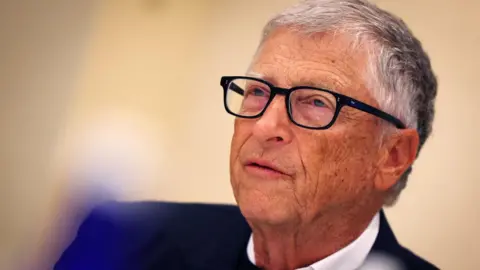In a bold declaration, Bill Gates, the co-founder of Microsoft, has announced his ambitious plan to donate a significant portion of his immense wealth, stating that he intends to give away a staggering 99% of his fortune by the year 2045. In a recent blog post, Gates articulated his commitment to accelerating his philanthropic efforts through the Bill & Melinda Gates Foundation, asserting that he aims to end the foundation’s operations by the aforementioned date. At 69 years old, Gates underscored the urgency of this initiative, noting that he wishes to leave a legacy that avoids the phrase “he died rich” in future conversations about his life.
In his expansive philanthropic endeavor, Gates revealed that the foundation has already contributed over $100 billion toward various health and development projects globally. He anticipates an outflow of an additional $200 billion over the next two decades, provided economic conditions permit. His financial trajectory was illustrated in his blog with a hand-drawn downward arrow on a timeline, symbolizing his intent to reduce his wealth dramatically by 2045.
Gates drew inspiration for his charitable commitment from historical perspectives on wealth and responsibility, notably referencing an essay written by industrialist Andrew Carnegie in 1889 called “The Gospel of Wealth.” Carnegie posited that affluent individuals have an obligation to return their fortunes to society, a sentiment that Gates echoed by quoting Carnegie’s assertion that “the man who dies thus rich dies disgraced.” This philosophical alignment reflects Gates’s ongoing evolution in thinking about the role of wealth in society and philanthropy.
Importantly, Gates’s new strategy marks a significant shift from his previous intentions, which included plans for the foundation to persist for several decades following both his and Melinda’s passing. During a conversation on the BBC’s Newshour, Gates remarked on this transition, stating that other wealthy individuals would emerge in the coming years to confront future challenges, allowing him to focus on immediate pressing issues. He further explained that such urgency is crucial, as it enables greater spending without the constraint of perpetual operational goals, assuring that his financial contributions will align closely with his values.
Even with this substantial commitment to philanthropy, experts estimate that Gates will retain a billionaire status, as his current net worth stands at approximately $108 billion, ranking him as the fifth-richest person globally according to Bloomberg. This raises critical discussions regarding the implications of massive wealth redistribution and the socio-economic dynamics surrounding philanthropic efforts.
In his recent dialogue regarding his philanthropic strategies, Gates has made three primary focus areas clear: first, to eliminate preventable diseases that primarily afflict mothers and children; second, to eradicate infectious diseases such as malaria and measles; and third, to alleviate poverty for millions around the globe. Gates’s dedication to these causes remains unwavering, particularly in light of his criticisms directed at governments in the US, UK, and France for their reductions in foreign aid budgets. He emphasized that global wealth disparity remains a pressing concern, particularly when comparing wealthiest nations against impoverished populations.
In a candid discussion, Gates expressed concern over cuts to U.S. foreign aid, explicitly attributing them to preventable mortality rates among children worldwide. He elaborated on the profound effects of funding cuts on public health initiatives, noting that such decisions could lead to preventable infections and a rise in mortality rates, particularly among vulnerable populations. This stark reminder of the tangible human cost associated with financial policies serves as a motivator for Gates’s ongoing philanthropic resolve.
In conclusion, Bill Gates’s pronouncement about giving away the majority of his wealth signals a transformative moment within the realm of philanthropy. His strategic shift underscores a growing awareness of the societal responsibilities that accompany great wealth and the moral obligations to address pressing global challenges. As Gates accelerates his charitable efforts, the repercussions of this initiative will likely resonate through various sectors, inspiring both dialogue and action in the realm of global humanitarian efforts.



